Jericho-Trompete ("Jericho Trumpet") ...
Fri Jun 20, 2014 3:37 pm
Upon the leading edges of the Junkers Ju87 Stuka's faired main gear legs were mounted the Jericho-Trompete ("Jericho Trumpet") wailing sirens, becoming the propaganda symbol of German air power and the blitzkrieg victories of 1939–1942.
The siren is electrically engaged from the cockpit. The small prop spins in flight anyway but the actual siren engaged by the pilot electrically (solonoid contact) from the cockpit. There's a "brake" or more closely, a clutch, that keeps the siren mechanism from sounding until the drive brakes are released. As soon as the drive brakes are retracted, the Jerico Trumpet disengages. Sometimes the brake didn't reset, and the pilot had to listen to the thing all the way back to base.
Quote from Stuka-Pilot Hans-Ulrich Rudel: His Life Story in Words in Photographs
"The screaming siren of the Junkers Ju 87 dive-bomber was, at least for the early part of the war, synonymous with German blitzkrieg tactics and Nazi prowess. Highly popular with the Propaganda Ministry, the Stukas represented the peak of German military might. It was usually deployed before the army's attack and would soften any known defensive strong points. In the heat of the battle, however, army commanders would radio the Luftwaffe to send Stukas to destroy any unexpected opposition. When air superiority was obtained, the seagull-looking Stukas would harass retreating or trapped Allied troops. The plane was used extensively and almost exclusively to support army operations. The tight and smooth cooperation and communication between army and Luftwaffe commanders were the key elements in the successful campaigns in 1940. The Ju 87 was slow and had a limited range, but it was a surprisingly accurate bomber. The bombs were basically controlled by the pilot until the very last moment. Usually a wing of 30 Stukas would attack a target in 10 groups of three planes. The common practice of a pilot was to begin his dive at 15,000ft at an angle of 60o-90o, turn on the cardboard siren, and dive earthward at up to 350mph. He would drop the bomb at around 2,000ft, and then immediately pull up the nose and overcome a force of four G to resume level flight. The Ju 87B was armed with two forward firing machine-guns, one machine gun in the rear cockpit for defense, four 110lb-bombs under the wings, and one 551lb-bomb under the fuselage in a clutch."
These photos clearly show these wailing sirens.




Photo source: ecpad website.
The siren is electrically engaged from the cockpit. The small prop spins in flight anyway but the actual siren engaged by the pilot electrically (solonoid contact) from the cockpit. There's a "brake" or more closely, a clutch, that keeps the siren mechanism from sounding until the drive brakes are released. As soon as the drive brakes are retracted, the Jerico Trumpet disengages. Sometimes the brake didn't reset, and the pilot had to listen to the thing all the way back to base.
Quote from Stuka-Pilot Hans-Ulrich Rudel: His Life Story in Words in Photographs
"The screaming siren of the Junkers Ju 87 dive-bomber was, at least for the early part of the war, synonymous with German blitzkrieg tactics and Nazi prowess. Highly popular with the Propaganda Ministry, the Stukas represented the peak of German military might. It was usually deployed before the army's attack and would soften any known defensive strong points. In the heat of the battle, however, army commanders would radio the Luftwaffe to send Stukas to destroy any unexpected opposition. When air superiority was obtained, the seagull-looking Stukas would harass retreating or trapped Allied troops. The plane was used extensively and almost exclusively to support army operations. The tight and smooth cooperation and communication between army and Luftwaffe commanders were the key elements in the successful campaigns in 1940. The Ju 87 was slow and had a limited range, but it was a surprisingly accurate bomber. The bombs were basically controlled by the pilot until the very last moment. Usually a wing of 30 Stukas would attack a target in 10 groups of three planes. The common practice of a pilot was to begin his dive at 15,000ft at an angle of 60o-90o, turn on the cardboard siren, and dive earthward at up to 350mph. He would drop the bomb at around 2,000ft, and then immediately pull up the nose and overcome a force of four G to resume level flight. The Ju 87B was armed with two forward firing machine-guns, one machine gun in the rear cockpit for defense, four 110lb-bombs under the wings, and one 551lb-bomb under the fuselage in a clutch."
These photos clearly show these wailing sirens.




Photo source: ecpad website.
Last edited by Mark Allen M on Mon Apr 25, 2016 10:09 am, edited 1 time in total.
Re: Jericho-Trompete ("Jericho Trumpet") ...
Fri Jun 20, 2014 5:03 pm
Interesting photos... Interesting differences in the canopy frames, etc. Thanks for posting Mark.
Re: Jericho-Trompete ("Jericho Trumpet") ...
Fri Jun 20, 2014 5:06 pm
Interesting thread Mark.
Makes you wonder if any of these sirens still exist?
Andy
Makes you wonder if any of these sirens still exist?
Andy
Re: Jericho-Trompete ("Jericho Trumpet") ...
Fri Jun 20, 2014 5:53 pm
DH82EH wrote:Interesting thread Mark.
Makes you wonder if any of these sirens still exist?
Andy
the Stuka at the Auto und Technik Museum in Sinsheim seems to still have the siren, or at least the bump where the siren was:
http://axis.classicwings.com/Luftwaffe/ ... nsheim.jpg
http://de.wikipedia.org/wiki/Junkers_Ju ... nsheim.jpg
greg v.
Re: Jericho-Trompete ("Jericho Trumpet") ...
Fri Jun 20, 2014 6:35 pm
Nice pics. the Ju-87D is the best looker I think. I note some appear to have armor plate on the cockpit next to the pilot. I guess the GIB doesn't count! 

Re: Jericho-Trompete ("Jericho Trumpet") ...
Fri Jun 20, 2014 6:37 pm
Agreed.
Last edited by Mark Allen M on Mon Apr 25, 2016 10:10 am, edited 2 times in total.
Re: Jericho-Trompete ("Jericho Trumpet") ...
Fri Jun 20, 2014 7:18 pm
The last photo is reversed.
Re: Jericho-Trompete ("Jericho Trumpet") ...
Fri Jun 20, 2014 7:47 pm
I don't think I've ever seen one.
How many exist today ?
How many exist today ?
Re: Jericho-Trompete ("Jericho Trumpet") ...
Fri Jun 20, 2014 10:44 pm
John Dupre wrote:The last photo is reversed.
Corrected
Re: Jericho-Trompete ("Jericho Trumpet") ...
Sat Jun 21, 2014 2:05 am
Just this week I was wondering how the sirens worked. Thanks very much for posting!
Re: Jericho-Trompete ("Jericho Trumpet") ...
Sat Jun 21, 2014 3:05 am
I think the sirens seen on the RAF Museum Stuka in the photos are cosmetic additions added when they were considering using the aircraft in the film "Battle of Britain." The dive brakes and bomb racks are also likely cosmetic add-ons, as I believe the aircraft was built as a G-model tank buster. Markings appear to be a film paint job, and the rear canopy gun mount is completely wrong for any Stuka variant..it looks like a cosmetic attempt to recreate the earlier style "bug eye" mount used on the BoB-era Ju-87Bs. As I recall they got the engine running, but decided not to fly it for the film..probably best, considering how rare it is.
The Ju-87R (nearly identical to a B) in the Chicago Museum of Science and Industry of course doesn't have the sirens, as it's missing the wheel pants entirely. I've always wished they'd make some fake ones out of fiberglass or something.
SN
The Ju-87R (nearly identical to a B) in the Chicago Museum of Science and Industry of course doesn't have the sirens, as it's missing the wheel pants entirely. I've always wished they'd make some fake ones out of fiberglass or something.
SN
Re: Jericho-Trompete ("Jericho Trumpet") ...
Sat Jun 21, 2014 9:19 am
makin' boost wrote:I don't think I've ever seen one.
How many exist today ?
Only 2 complete examples, in Chicago and London. Also a few wrecks. Really hope the rumors of Paul Allen putting one together would be fantastic, it really is one if the most iconic airplanes of WW II. Would love to see one fly.
Nice pictures Mark.
Re: Jericho-Trompete ("Jericho Trumpet") ...
Sun Jun 22, 2014 9:00 pm
Good thread!
As an addition to the Rudel quote, it's interesting he doesn't mention that the Ju 87 had an auto-pullout device to assist or direct the pilot at the right height.
http://en.wikipedia.org/wiki/Junkers_Ju ... _procedure
As to the RAF Museum's Ju 87G, it's correct that it was bastardised for the Battle of Britain film, but what actually happened is usually mangled too. Here's the story from the aircraft's data card, available as a free PDF download from the RAF Museum's website (my emphasis):
http://www.rafmuseum.org.uk/documents/c ... -Ju-87.pdf
Linked from: http://www.rafmuseum.org.uk/research/co ... s-ju87g-2/
So that's why the film models have the far-too-late tapered nose and tapered canopy of the D & G model Stukas, the 1940 examples all being "Bertha" - 'B' models.
Also the colo(u)r photos Mark posted above are (as he's said) from when it was at Colerne, and just post filming. Since then, the aircraft has gradually been returned to a more authentic configuration for it as a later model-type.
I have also been told that one reason is didn't fly for the film was that the electrics were fried either by putting the wrong voltage through, or just issues with (then) 20 plus year old wartime wiring. (I'm sure if someone can confirm or deny that and they read this, we'll hear!) At the same time a keen team bastardised the Messerschmitt Bf 109G-6 10639 'Black 6', but didn't get it airworthy. However the did make the later restoration of it as G-USTV much harder having removed and discarded many original parts in favour of British hardware.
Regards,
As an addition to the Rudel quote, it's interesting he doesn't mention that the Ju 87 had an auto-pullout device to assist or direct the pilot at the right height.
http://en.wikipedia.org/wiki/Junkers_Ju ... _procedure
As to the RAF Museum's Ju 87G, it's correct that it was bastardised for the Battle of Britain film, but what actually happened is usually mangled too. Here's the story from the aircraft's data card, available as a free PDF download from the RAF Museum's website (my emphasis):
Mar 67
Moved to RAF Henlow, Beds by this date (Air Britain Digest April 1967 p.99) along with other AHB aircraft for possible use in the `Battle of Britain' film. Repainted, codes W8 + A (carried by a Ju87 unit in Europe in 1940). Also given dummy wooden dive brakes, undercarriage leg sirens, a fibreglass bomb and a modified rear gun position (removed and replaced by the original rotating twin 7.92mm MG81 Z mount in Dec 1998). Engine run at least once and probably taxied
-
see St Athan Collection Guide 1973 (R015562) and archives B2707. Photos: Flying Review International Sep 67, Air Pictorial Sep 67 p.327, Aeromilitaria 3/1984 p.75, The Captive Luftwaffe (009336) p.62; Aircraft Illustrated Sep 71 p.358; Aeroplane October 2009 p.25; Flypast February 2011 p.72.
The film makers eventually obtained MoD permission to restore the Ju87 to airworthy condition, and Viv Bellamy had started the engine on the third pull (Aeroplane Monthly May 98 p.62) but inspection of the airframe revealed that restoration to airworthiness would be a costly exercise, so three Percival Proctors were modified as `Proctukas', although scale models (fashioned after late model Stukas to match the RAFM example if it had flown for the film) were used in the final film version. Inspection at this time confirmed that the w/nr was 494083 (FlyPast Aug/Sep 67).
http://www.rafmuseum.org.uk/documents/c ... -Ju-87.pdf
Linked from: http://www.rafmuseum.org.uk/research/co ... s-ju87g-2/
So that's why the film models have the far-too-late tapered nose and tapered canopy of the D & G model Stukas, the 1940 examples all being "Bertha" - 'B' models.
Also the colo(u)r photos Mark posted above are (as he's said) from when it was at Colerne, and just post filming. Since then, the aircraft has gradually been returned to a more authentic configuration for it as a later model-type.
I have also been told that one reason is didn't fly for the film was that the electrics were fried either by putting the wrong voltage through, or just issues with (then) 20 plus year old wartime wiring. (I'm sure if someone can confirm or deny that and they read this, we'll hear!) At the same time a keen team bastardised the Messerschmitt Bf 109G-6 10639 'Black 6', but didn't get it airworthy. However the did make the later restoration of it as G-USTV much harder having removed and discarded many original parts in favour of British hardware.
Regards,
Re: Jericho-Trompete ("Jericho Trumpet") ...
Sun Jun 22, 2014 11:44 pm
Great info as always, James..that jives with all the anecdotes I've heard over the years. 
I hadn't heard that the RAF Museum Stuka had been refitted with the correct rear gun canopy..that's great news. It would be cool if they could build some mockup wing guns and make her a proper kannonenvogel.
I've examined the Chicago Stuka up close many times (or as close as you can get anyway.) It's in rough shape, and missing a few bits, but I understand it's almost completely original, including most of the paint. Still, I'd like to see it taken down from the dusty rafters and sent to someplace like the NMUSAF or NASM where it might be more appreciated. It's kind of a footnote where it is now, and ignored by most visitors.
Here are a few pics I took last Autumn..


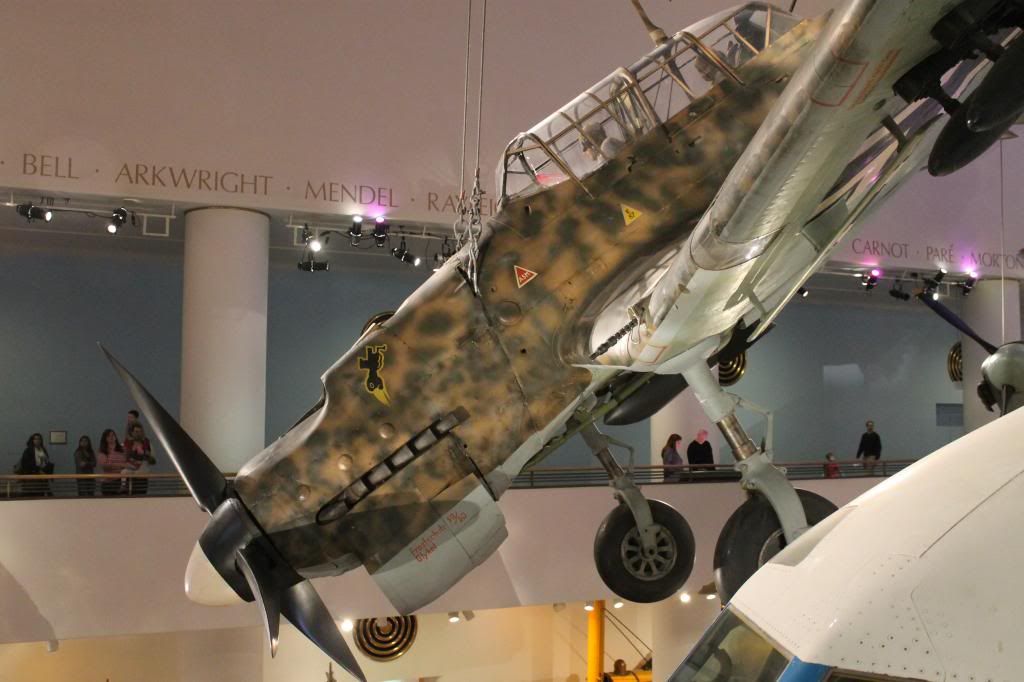
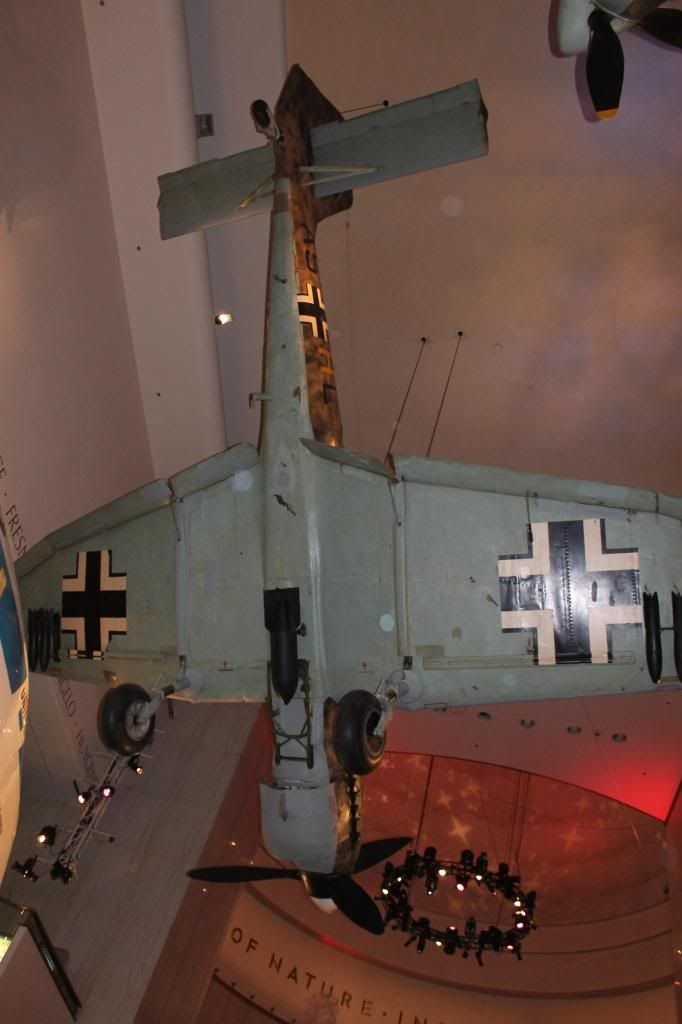
The entire airframe is peppered with holes and slashes, I assume from shrapnel. I know there were some A6M Zeroes that toured the country that tourists could take a whack at with an ax for a fee, but it seems if that had been done with the Stuka it would have a lot more damage, and in more concentrated areas, like the insignias. This picture is from an old book in my reference library..I think it's the same aircraft as it was captured by the Brits in North Africa.
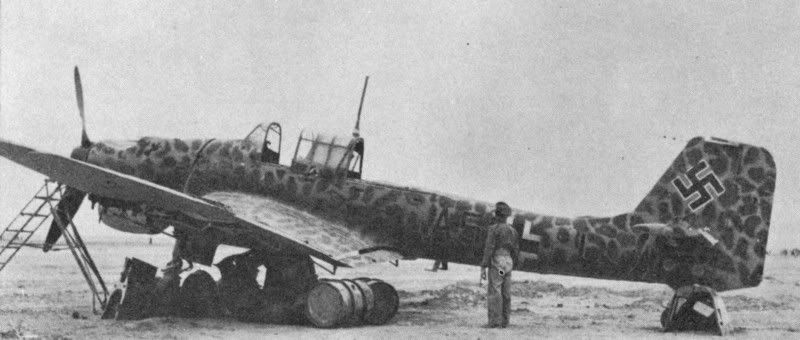
On my last visit to the museum, I was surprised to stumble across the Stuka's engine. It was part of a rotating "here's some stuff from our storage attic" display tucked away in a corner down in the basement (the Merlin behind it is from the museum's Spitfire.)
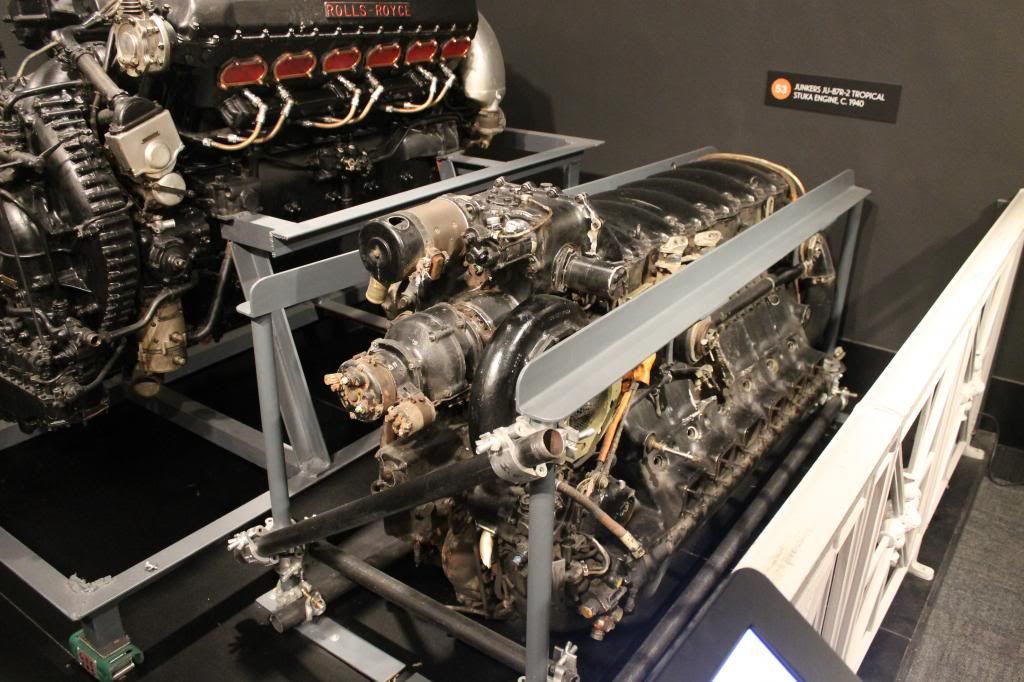
The Jumo has a big chunk missing from the side. I don't know if this is damage, or it was cut open as part of its evaluation by the Allies.
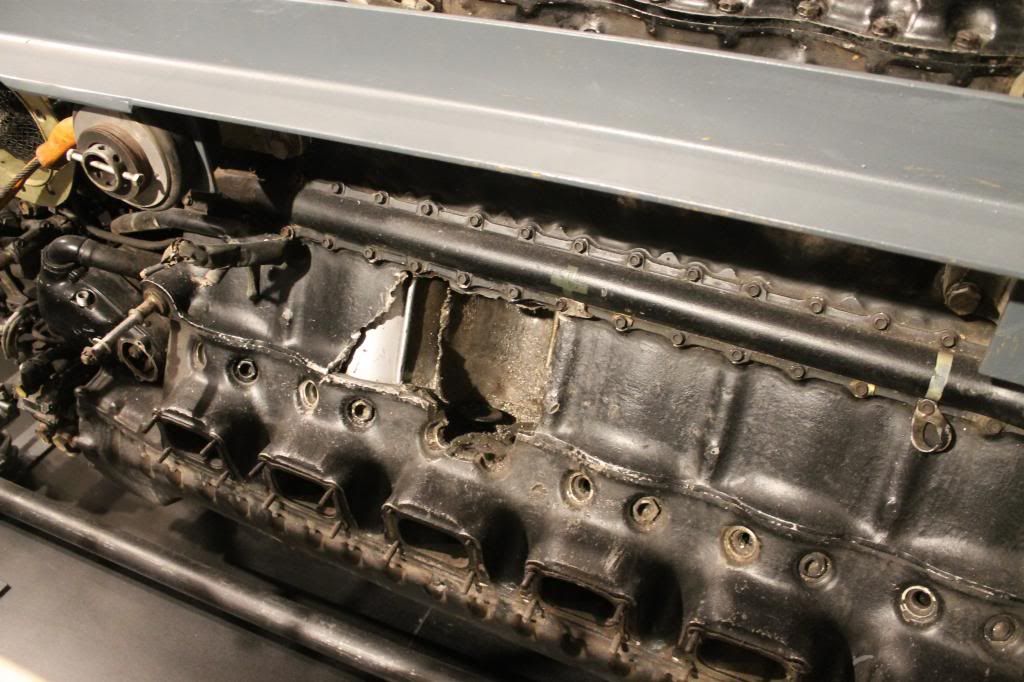
SN

I hadn't heard that the RAF Museum Stuka had been refitted with the correct rear gun canopy..that's great news. It would be cool if they could build some mockup wing guns and make her a proper kannonenvogel.
I've examined the Chicago Stuka up close many times (or as close as you can get anyway.) It's in rough shape, and missing a few bits, but I understand it's almost completely original, including most of the paint. Still, I'd like to see it taken down from the dusty rafters and sent to someplace like the NMUSAF or NASM where it might be more appreciated. It's kind of a footnote where it is now, and ignored by most visitors.
Here are a few pics I took last Autumn..




The entire airframe is peppered with holes and slashes, I assume from shrapnel. I know there were some A6M Zeroes that toured the country that tourists could take a whack at with an ax for a fee, but it seems if that had been done with the Stuka it would have a lot more damage, and in more concentrated areas, like the insignias. This picture is from an old book in my reference library..I think it's the same aircraft as it was captured by the Brits in North Africa.

On my last visit to the museum, I was surprised to stumble across the Stuka's engine. It was part of a rotating "here's some stuff from our storage attic" display tucked away in a corner down in the basement (the Merlin behind it is from the museum's Spitfire.)

The Jumo has a big chunk missing from the side. I don't know if this is damage, or it was cut open as part of its evaluation by the Allies.

SN
Re: Jericho-Trompete ("Jericho Trumpet") ...
Mon Jun 23, 2014 12:05 am
Thanks Steve! We've been here before, and that includes you & I...
You are, of course the 'undisputed Chicago Stuka Trivia Master'...
viewtopic.php?t=19089
Also:
viewtopic.php?t=10829
Cheers,
You are, of course the 'undisputed Chicago Stuka Trivia Master'...
viewtopic.php?t=19089
Also:
viewtopic.php?t=10829
Cheers,